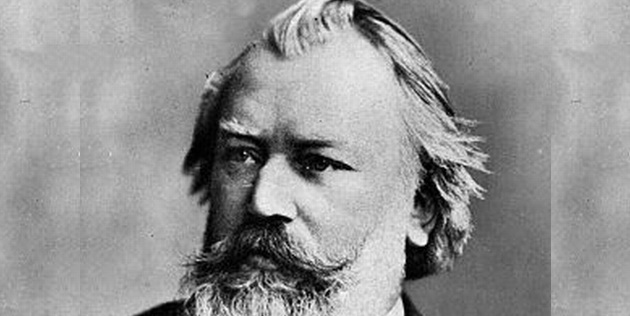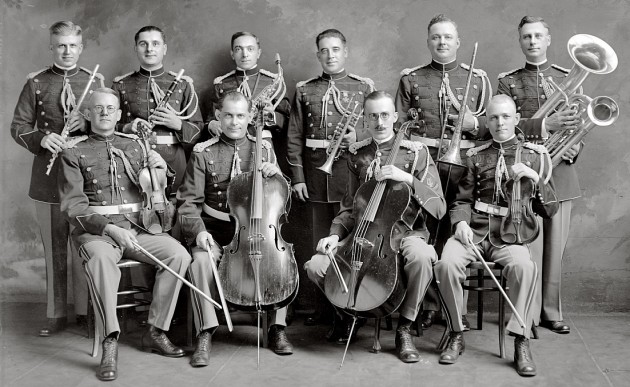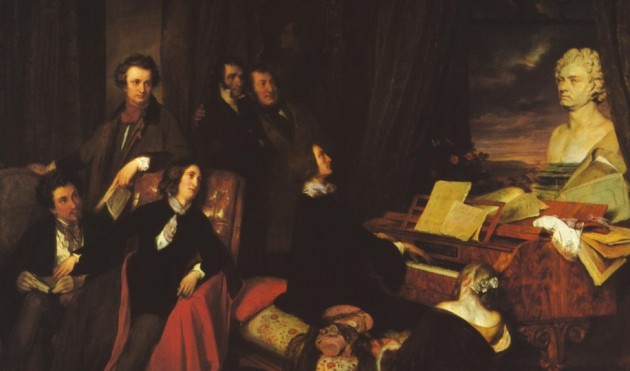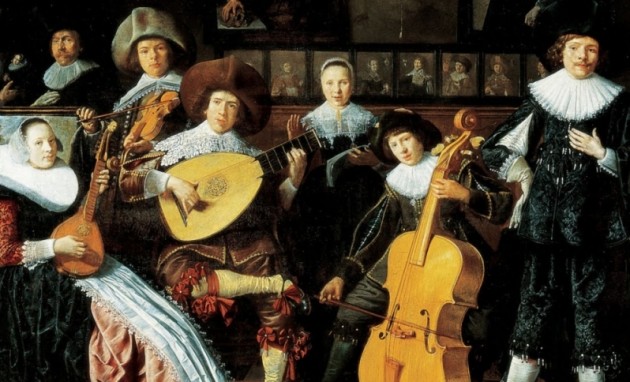All the music in this article can be found on this YouTube playlist or alternatively on this Spotify playlist, which also contains lots of further recommended listening.
Classical music is dying – you and I are going to save it through sheer listening power. Put down your copy of F♯ A♯ ∞ and listen to something a little bit older, but which uses exactly the same proportions. I’ve run out of convincing arguments to persuade you to listen to classical music, so this month I want to tell you about an amazing thing which happened in London a few weeks ago. At St. Pancras International station, the BBC symphony orchestra suddenly appeared and performed the last movement of Beethoven’s ninth symphony. People who looked like ordinary commuters suddenly produced sheet music from nowhere and started singing at the tops of their voices on the balconies above. The soloists were so close to the audience and sang so enthusiastically that they ended up spitting on people. But I was there, and I was happy to have been spat on. Because it was Beethoven talking to his God, and to the world, centuries after his death. How many people can say that?
#6 – Wonderbrahms
This month, we’re going to be dealing with a titan of High Romanticism, and I’m hoping that this is going to be an easy sell, because as I mentioned last time, you already know his music, and, let’s face it, the facial hair alone justifies writing an article about him:
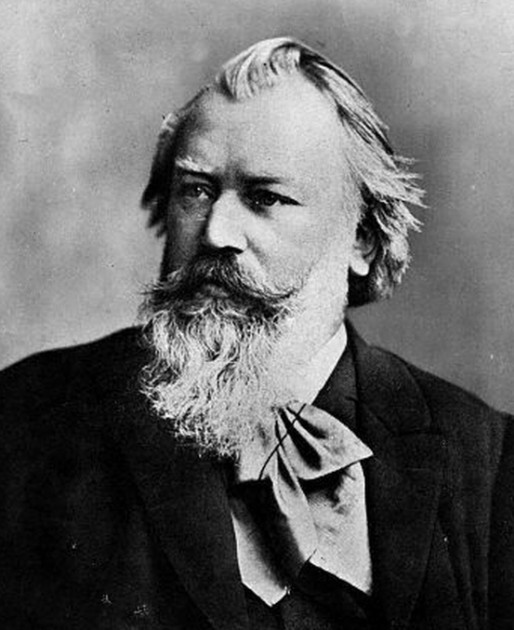
Brahms is yet another name on my ever-growing list of underrated, underappreciated and sometimes wilfully misunderstood composers. Even relatively recently, Brahms’ music was maligned and neglected for being too traditional, too serious, too academic, too thick and impenetrable, and well, just too German. The prevailing attitude to Brahms for much of the twentieth century was summed up neatly by Jean-Luc Godard in his 1959 film, Breathless. A scene in the film shows a man being assailed by journalists at a press conference. One of them asks him if he enjoys Brahms, to which he replies, deadpan, “Like everyone, no!” Why was there so much contempt for someone who is now so well-regarded? There are several answers to that question, the most obvious being that orchestras just kept growing larger and larger after the composer’s death, making his music sound swollen and protracted. The root of the problem, however, goes back (rather appropriately) to an article in a music magazine…
Brahms came from a very modest background, the son of a freelance musician, and initially made his way by playing piano in the seedy bars and brothels of the north German city of Hamburg. The young and ambitious composer set out to make a name for himself by meeting the leading musical power couple of the time, Robert and Clara Schumann. Although Brahms was yet to have a single piece published, the Schumanns were hugely impressed by his virtuosity and compositional flair, and took him into their home as a musical protégé. In 1853, Robert, who was not always the most mentally balanced of people, suddenly decided to write an article in a journal he had co-founded years before, praising Brahms in these extravagant terms:
“[This man], called to give expression to his times in ideal fashion: a musician who would reveal his mastery not in gradual stages but like Minerva would spring fully armed from Kronos’s head. And he has come; a young man over whose cradle Graces and Heroes have stood watch.”
This kind of hyperbole placed an immense burden on to the shoulders of young Johannes. After Beethoven’s death in 1827, very few people dared to write music in the forms which he had brought to a peak of perfection – namely the symphony, the piano sonata, and the string quartet. As much as Beethoven had opened up new creative possibilities, he also cast an intimidating shadow over everyone who followed him. But in his article, Schumann appeared to be announcing that this era was over, and Brahms would be the new saviour of Romanticism, the new Beethoven. What Schumann hadn’t counted on, however, was Brahms himself. Whether it was the pressure of expectation, or something innate in the composer’s personality, Brahms became a ruthless perfectionist, totally revising or even destroying his own works if he felt them to be sub-standard, purging them of the bizarre flourishes he was sometimes prone to, until they were streamlined, beautifully proportioned and correct in every way. Brahms was also notoriously self-deprecating and modest about his achievements – in a famous incident when he met the wife of his good friend Johann Strauss II, she asked him to sign her fan, which he did by penning the opening notes of the Strauss’ Blue Danube waltz, and writing underneath “Alas, not by Brahms!” Brahms didn’t limit his criticism to his own works, however – his rather harsh critique of a symphony by Hans Rott actually drove its composer mad – he became convinced that Brahms had filled a train he was riding with dynamite and wrote down all his future compositions on toilet paper, from the comfort of an insane asylum. While incidents like this, and his rudeness towards society ladies, didn’t do Brahms’ public image much good, in private he quietly funded and supported his fellow composers so that they would not be reliant on commissions for their income.
A few articles ago I touched on the distinction between “absolute” and “programmatic” music, and the so-called “War of the Romantics.” “Programmatic” music drew inspiration from things outside of music itself, such as the sounds of nature – Vivaldi’s Four Seasons and Beethoven’s Pastoral Symphony were early examples of this kind of aural storytelling. During the 19th century, composers like Liszt (pictured above, at the piano) and Wagner took the idea of programmatic music and pushed it much further, using episodes from history or literature as inspiration for long, continuous orchestral pieces called Tone Poems. Proponents of “absolute” music on the other hand regarded composition as a completely autonomous pursuit, which had its own internally generated set of rules, and therefore required no external sources. Brahms stood firmly in the “absolute” camp, which was connected to the city of Leipzig, where both J.S. Bach and Mendelssohn had lived and worked, while the “programmatic” New German School made its home in Weimar, a city associated with philosophers and poets like Goethe and Schiller.
Absolute music was often conflated with musical traditionalism and conservatism, while programmatic music was frequently regarded as more progressive, but these categories are rather arbitrary and misleading. To give just one example, the radical and iconoclastic 20th century composer Arnold Schoenberg made orchestral arrangements of Brahms’ work and was deeply influenced by him, even though superficially it seemed like he owed more to people like Liszt and Wagner, thanks to their experiments with atonality. Furthermore, Brahms very rarely expressed an opinion on these aesthetic squabbles, letting his music do the talking instead, breaking with just as many traditions as he preserved. He also quietly admired many composers on the other side of the compositional divide, including Wagner and Berlioz, making the apparently simple picture of this so-called “War” rather more complicated. While it was easy for some to brand Brahms as a reactionary, all he really wanted to do was finish exploring areas of composition that others had abandoned or assumed to be outdated. Eventually, a new generation of Romantic Nationalist composers, including Brahms’ own pupil Dvorak, demonstrated how ridiculous these divisions had become, and that arguments about form stood in the way of sincere musical expression.
Brahms’ relationship to music of the past, particularly in the German tradition, was also complex. He worshipped Bach, loved Heinrich Schütz, cherished Haydn, revered Mozart, idolised Beethoven and revived Schubert, so his work represents a complex synthesis between the new possibilities of the expanded Romantic orchestra and the forms and methods of the past. He reintroduced firm classical discipline and structure into the increasingly bloated music of the day, bringing back movement, development and rhythm where there had been stasis and stagnation. He worked in every traditional genre (except opera, which he left to Wagner) but totally transformed the content of each one within his own idiom.
For audiences more accustomed to the elegance of Mendelssohn or the brutal power of Beethoven, Brahms’ music initially seemed cold, cerebral and inaccessible, but eventually people embraced his work, and he became popular and successful in spite of his overt seriousness. Even now it can still take a little while to really appreciate what Brahms achieved, because very often he buried the most exciting elements of his work deep inside huge musical structures, or nestled them beneath thick layers of orchestral texture. He often keeps you waiting until the very end before revealing some unexpected but transcendent resolution, while at other times he simply presents a lush orchestral theme and then proceeds to develop it into extraordinary new forms. It’s often tempting to draw simplistic parallels between the personality and the work of a musician, but in Brahms’ case it actually makes sense to do so – like the man himself, the music is often a little difficult and unwelcoming at first, but once you get to know it, you see how much warmth, humanity and generosity is contained within it. His work is robust and muscular, yet sweeping and graceful, dense and full-bodied, yet filled with passion, sometimes menacing and intense, at other times lively and boisterous. Brahms realised the potential of enlarged orchestras with a wider range of dynamics and instrumentation on offer – he could make a piece of music stand up on its hind legs and really roar, but also create shimmering moments of flow and drift. I’m not a musicologist, so it’s difficult to pin down precisely what makes Brahms’ music so distinctive in technical terms, but after thinking about it long and hard, I’ve come to the conclusion that the best way to describe his particular soundworld is this: Listening to Brahms is like eating a rich fruitcake while flying a stealth bomber through a lightning storm. The rest of Brahms’ life was largely uneventful (except for his possible affairs with Schumann’s widow, and her daughter…) so without further ado, let’s get on to the music…

